Regenerating ourselves and the land – inspiration from Carbon Calling
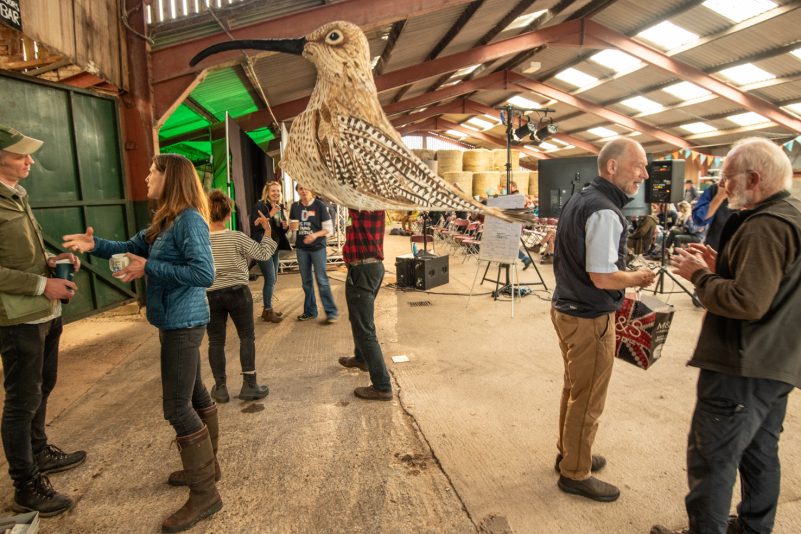
What are the ripples of conversation around Regenerative Farming? The Frasers report back from the north of England’s ‘Carbon Calling’ festival, held each year on a farm near Penrith in Cumbria. (words, Harriet Fraser, images, Rob Fraser, the PLACE Collective).
One of the central questions posed by the organisers of Carbon Calling is: What do we each do, in order to change? Over the course of the three-day event, this question was addressed both head on and sideways.
The focus of Carbon Calling is on regenerative practices – chiefly, on regenerative farming, but it’s clear in all the conversations and presentations that the foundation of any approach, and any process of change, is attention to mindset, and supporting one another in the development of regenerative thinking.
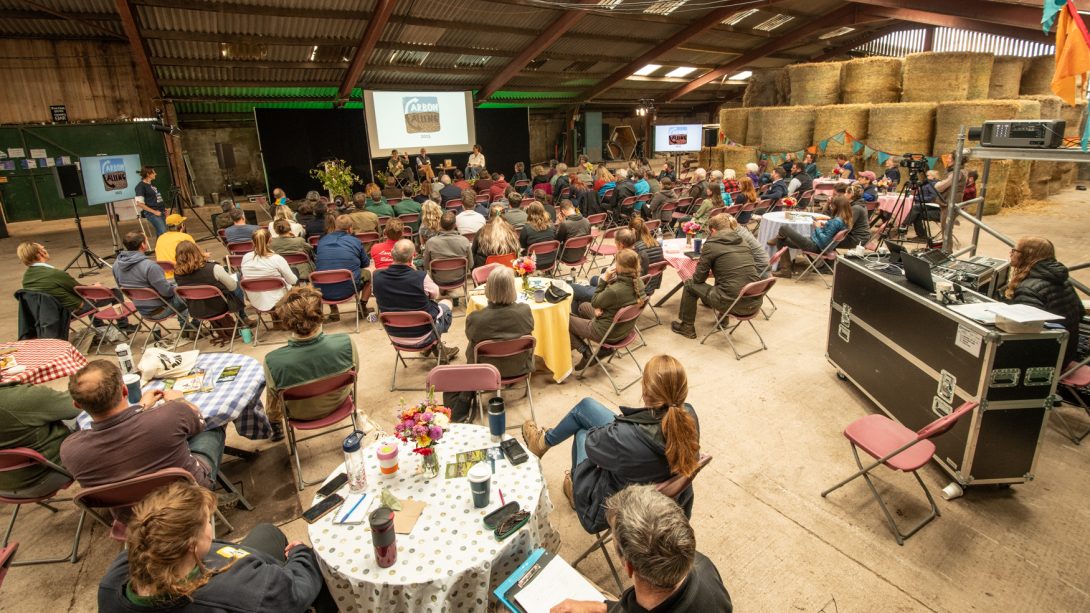
Carbon Calling, run by farmers Nic Renison and Liz Genever, is a relatively low-key event that punches well above its weight. There’s not much fussy or high-brow here: seats laid out in a barn, timetable written on a whiteboard, and a consistently relaxed attitude (though the toilets were the cleanest and most sophisticated Portaloos you may ever experience). This is part of the charm and helps to keep conversations grounded: it’s an event for farmers, that’s led by farmers.
That said, not everyone in attendance was a farmer, and not all the presentations were about farming, but everyone talked about wellbeing of both land and people, and principles of connection and care. And food was given centre stage: good not just as fuel, or something that’s produced in a way that is good for carbon storage, but food whose production goes hand-in-hand with nature and soil health, and is nutritional for people: more than one of the presenters suggested seeing food as medicine, mindful that good food is needed for good health. There was plenty of emphasis on the need to view food and land use together; one without consideration of the other forms an incomplete circle.
The food-farming-wellbeing-nature-care connection, a cycle that regenerates, is an entanglement that demands attention to all parts, and many of the presentations on the day drew attention to the fact that farming or ‘land use’ cannot be separated from attitudes of care (which could be contrasted with extraction or exploitation). This attitude applies to care of the land, care of the soil, and of course, care of ourselves, individually and as communities – the people who have control of the degradation or regeneration of the land. Jules Matthews underlined this as she spoke about wellbeing, and shared a Maori saying: What’s the most important thing? It’s the people, it’s the people, it’s the people.
We attended the second day, which was opened by Martin Lines (NFFN). His introduction stressed the importance of getting the transition in land use ‘right’, for nature and people, and this includes helping policy makers to better understand where change is already happening, and steer things in the right direction. Perhaps getting policy makers into the Carbon Calling barn is something to encourage next year.
The day’s wide-ranging presentations began with Judith Hutchison from Moffat in southern Scotland, where she farms with her husband and son. Like all the presenters on the day, Judith shared the good and the less good parts of her story; nothing is 100% positive, and it’s refreshing to hear honest stories about change. Judith talked of how she was spurred on to change, as she witnessed the land degrading, with a decrease in animal productivity, while the use of fertilisers and mineral inputs continued. She decided it was no good carrying on regardless, and working with nature felt like the right path.
‘Our job as farmers is in facilitating soil function,’ Judith said, who believes that everything else follows from this. It hasn’t been easy, however, with some resistance to change at home. Judith has found invaluable support from the South West Scotland Regenerative Farming Network – to share successes, but perhaps most importantly to share failures. Gradual change over the years has shown good results in from the livestock productivity, and Judith is persisting. She encourages others: ‘you need to be dogged and determined, see how it works in your place. The best decision you’ll make is the right one. The second-best decision you make is the wrong one. The worst decision is to do nothing.’
The presentations all followed this attitude: Do Something. Learn as much as you can, try it and refine it in the unique context of your own land and farming enterprise, and adapt. Build a community and care for land as well as people. There was strong agreement that it’s likely that the positive ripples will spread, as people support one another and share learning.
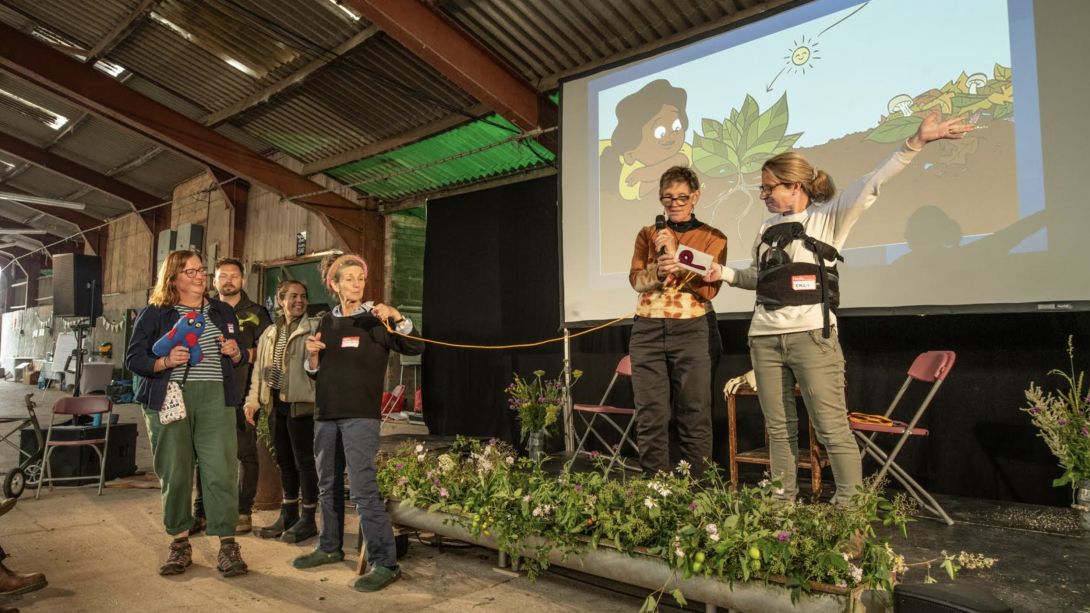
Audience participants take on roles of nematodes, microbes, tree and mycelial network while Jules Matthews talks about caring for soil, and restoring the microbial bridge. Image by Rob Fraser, PLACE Collective
The community is growing across the UK. Several of the speakers from Carbon Calling went south to join Groundswell: networks of ideas, skills and nature corridors are growing and it will be interesting to visit both events next year and take stock again.
Ten main takeouts from Carbon Calling: When it comes to making changes:
- Change is already happening: connect, and harness the energy
- Farmers listen to farmers: networks matter, for support, to share success stories and perhaps more importantly, to share and learn from ‘failures’
- Wellbeing for people, for soils, for animals, for planet are inextricably linked.
- Nutrient Density in food is crucially important: nutritional value has fallen dramatically and can be improved through improving soil- and nature-friendly farming practices.
- Measure and monitor: record baselines before implementing change.
- Think about consumers as collaborators.
- Shorten the links between production and supply, where possible.
- Don’t underestimate the seeds that you sow. Water them and others will pick up on what you are doing.
- Keep learning: without new awareness, we are destined to repeat the past. How can we see things differently?
- When introducing change, through learning from others: Bring it In, Bring it Home, Make it Your Own.
Presenters on Day included:
- Martin Lines, Chair, Nature Friendly Farming Network
- Judith Hutchison, Farmer, Moffat, Scotland
- Jannike Taylor, Farmer, Eden Valley, Cumbria, England
- Jules Matthews, Agroecological Farmer and Coach, New Zealand
- Dr David Unwin, ‘The low carb GP’, UK
- Andy Swinscoe, Cheesemaker, the Courtyard Dairy, Settle
- Mary-Ann Ochata, Chair, CPRE
- Rose Ferraby, artist/poet in residence
- And a wandering, giant curlew
Plus, onsite walks to discuss hedging, soil care, biochar, baselining biodiversity, using Ecological Outcome Verification (EOV), river flies, and trees
Here’s to next year!
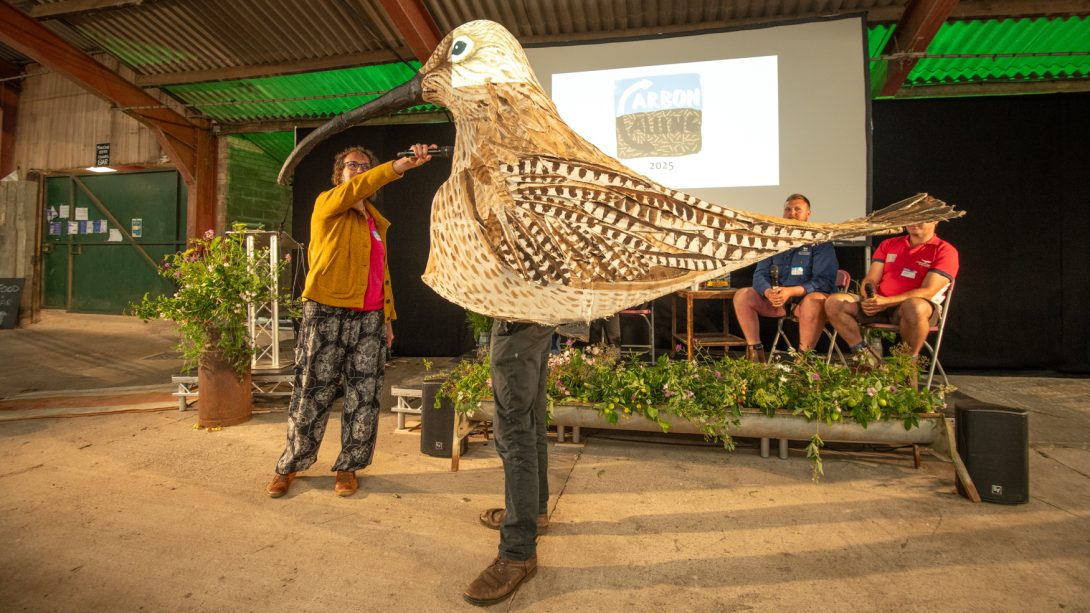
Rose Ferraby, artist/archaeologist, interviews the resident curlew. Image by Rob Fraser, PLACE Collective
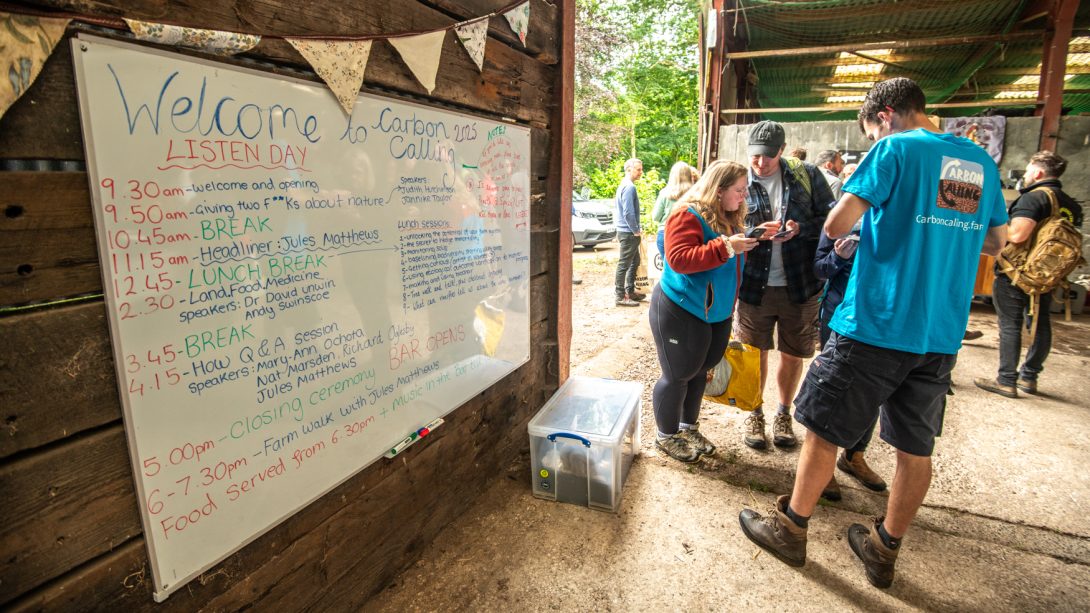
Schedule board at Carbon calling. Image by Rob Fraser, PLACE Collective
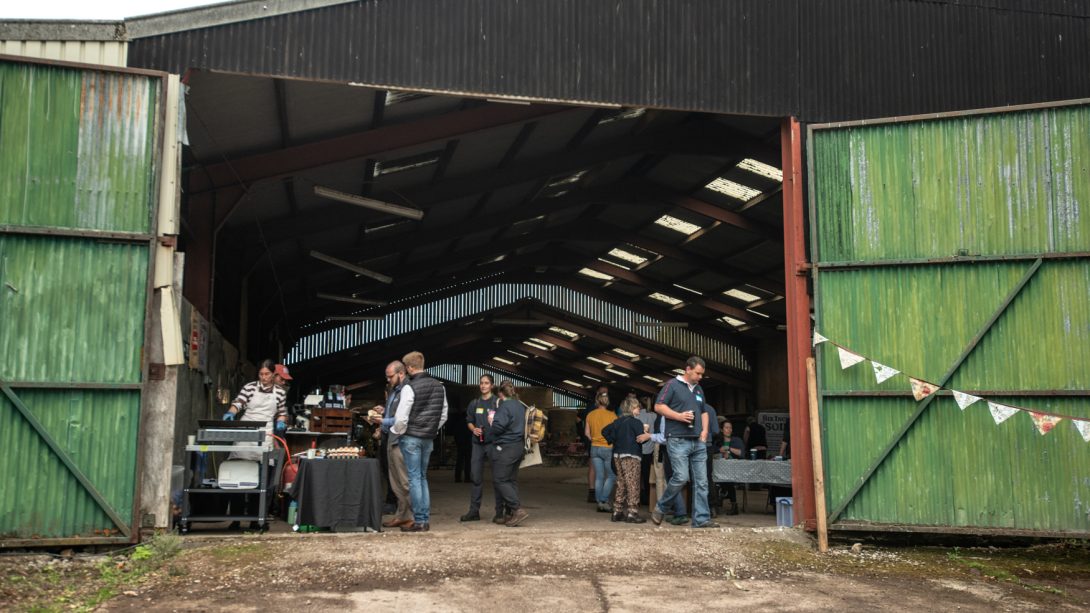
Entrance to the Carbon Calling barn. Image by Rob Fraser, PLACE Collective
Subscribe to our Newsletter
A quarterly update of all LUNZ Hub activities, events and news stories.
